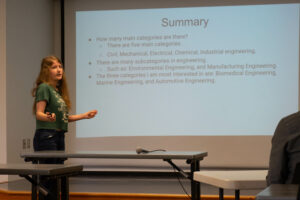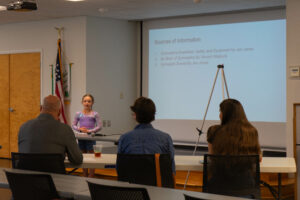Voices of the Future: Why Youth Public Speaking Matters
go.ncsu.edu/readext?1082202
en Español / em Português
El inglés es el idioma de control de esta página. En la medida en que haya algún conflicto entre la traducción al inglés y la traducción, el inglés prevalece.
Al hacer clic en el enlace de traducción se activa un servicio de traducción gratuito para convertir la página al español. Al igual que con cualquier traducción por Internet, la conversión no es sensible al contexto y puede que no traduzca el texto en su significado original. NC State Extension no garantiza la exactitud del texto traducido. Por favor, tenga en cuenta que algunas aplicaciones y/o servicios pueden no funcionar como se espera cuando se traducen.
Português
Inglês é o idioma de controle desta página. Na medida que haja algum conflito entre o texto original em Inglês e a tradução, o Inglês prevalece.
Ao clicar no link de tradução, um serviço gratuito de tradução será ativado para converter a página para o Português. Como em qualquer tradução pela internet, a conversão não é sensivel ao contexto e pode não ocorrer a tradução para o significado orginal. O serviço de Extensão da Carolina do Norte (NC State Extension) não garante a exatidão do texto traduzido. Por favor, observe que algumas funções ou serviços podem não funcionar como esperado após a tradução.
English
English is the controlling language of this page. To the extent there is any conflict between the English text and the translation, English controls.
Clicking on the translation link activates a free translation service to convert the page to Spanish. As with any Internet translation, the conversion is not context-sensitive and may not translate the text to its original meaning. NC State Extension does not guarantee the accuracy of the translated text. Please note that some applications and/or services may not function as expected when translated.
Collapse ▲Now, maybe it’s just me — but growing up, I was absolutely terrified of speaking in front of anyone other than my immediate family. School projects? A nightmare. Science fair? Terrifying. Honestly, even now, at twenty-three years old with a job that involves a lot of public speaking, I still sometimes get nervous before speaking in front of people I don’t know.
Thankfully, I’ve had to get used to speaking in front of others through the jobs I’ve had on my way to where I am today—from presenting projects in college, to working as a summer camp counselor at the aquarium, and now serving as the 4-H Agent for New Hanover County. Don’t get me wrong, I’m glad I became more comfortable with public speaking, but I do wish I’d had the opportunity to build that confidence earlier in life.
 Public speaking is one of the most important life skills a person can learn—and honestly, it’s also one of the most lacking skills people have today. It’s the cornerstone of so many careers: teaching, business, sales, scientific research, medicine, and more. Unfortunately, it’s also one of the biggest fears people have—and for good reason! It can be scary.
Public speaking is one of the most important life skills a person can learn—and honestly, it’s also one of the most lacking skills people have today. It’s the cornerstone of so many careers: teaching, business, sales, scientific research, medicine, and more. Unfortunately, it’s also one of the biggest fears people have—and for good reason! It can be scary.
I was lucky enough to develop my skills by presenting to younger kids during summer camps—kids who usually forgot about any mistake I made almost immediately. That low-pressure environment helped me build confidence. Starting to teach public speaking skills early can set youth up for future success in incredible ways.
That’s where New Hanover County 4-H comes in. We offer a fantastic opportunity for youth to begin developing public speaking skills early on through County Activity Day.
County Activity Day (CAD) is open to youth ages 5–18 and helps them get more comfortable with public speaking. So, what exactly is CAD? I’m glad you asked! It’s a day where youth give a short presentation on a topic of their choice in front of their peers and a panel of judges who provide helpful feedback to improve their skills.
 We’ve had youth present on everything from their pets to how to make a sandwich—even on proper running form! The topic possibilities are endless. After CAD, participants can choose to compete at district and state-level competitions if they’d like.
We’ve had youth present on everything from their pets to how to make a sandwich—even on proper running form! The topic possibilities are endless. After CAD, participants can choose to compete at district and state-level competitions if they’d like.
It’s an amazing opportunity to start building confidence and communication skills early — and I truly wish I had something like it when I was younger.
The N.C. Cooperative Extension Center for New Hanover County is located at the Arboretum, 6206 Oleander Drive. The gardens are free and open daily from 8 a.m. to 5 p.m. Reach Alex at alex_eaker@ncsu.edu or 910-798-7660.




